Age and speed maintenance in the 200m
One thing that has caught my attention lately is that the fastest performers during the 150-200m segment of the 200m generally have been very young. Here is a comparison between the fastest 150-200m segments and the fastest 0-50m segments when it comes to the median age of the performers.
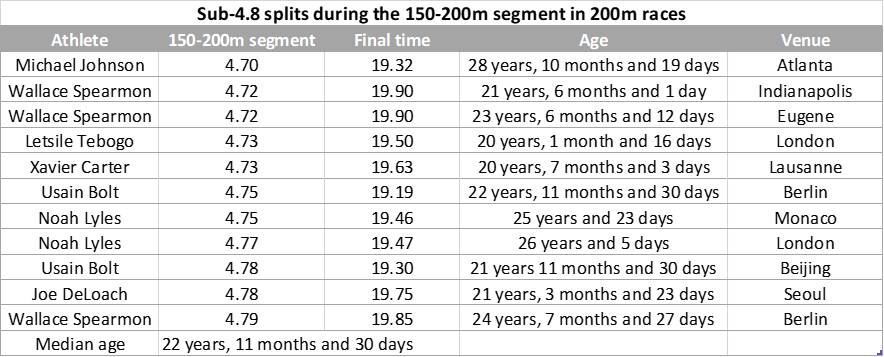
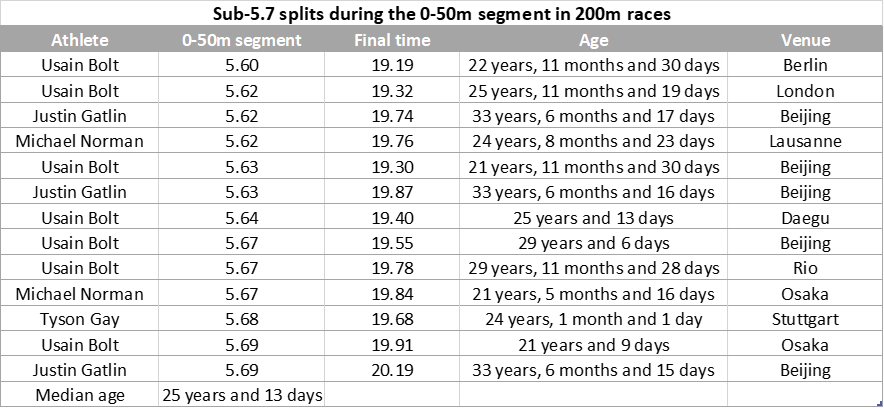
The median age difference of more than two years makes it seem as if running sub-4.8 over the last 50 metres of a 200m race is much more of a young man's game than running sub-5.7 over the first 50 metres is. Looking at the sub-9.3 splits during the 100-200m segment tells a similar story of that peak speed maintenance performance among top sprinters in the 200m generally seems to happen at a very young age.
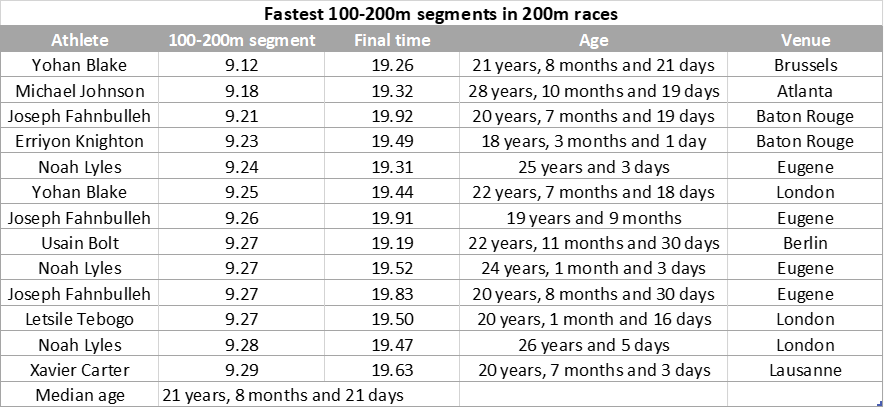
Because when comparing the thirteen fastest 100-200m segments to the thirteen fastest 0-100m segments we see that the median age difference is well over three years.
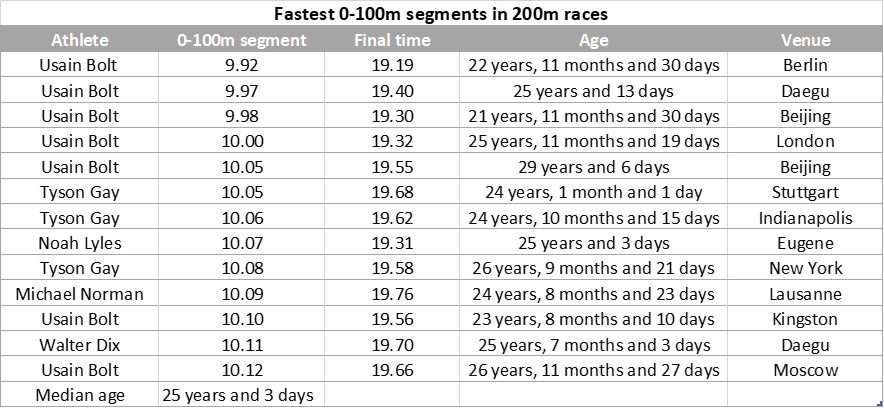
There have only been four sub-9.3 performances from two sprinters (Johnson and Lyles) where the sprinter in question was 24 years or older at the time. By comparison there have been ten sub-10.13 performances from five sprinters (Bolt, Dix, Gay, Lyles and Norman) where the sprinter in question was 24 years or older at the time.
The start of the 2024
season from Letsile Tebogo suggests that there might be coming more sub-4.8 and
sub-9.3 splits from him in the near future which could keep the trend of very young sprinters producing the majority of the top speed maintenance performances going.
On the other hand it will also be interesting to see if Noah Lyles (who turns 27 this summer) will continue to add performances to the list of fastest 150-200m and 100-200m segments. Lyles is already the second oldest sprinter to have produced sub-4.8 and sub-9.3 splits and considering how great he looked in his recent 14.41 performance in Atlanta it certainly seems like he might be able to continue to do so.
Since a number of the sub-9.3 performances were done with pretty significant tailwinds I also took a look at the median age in the thirteen fastest wind and altitude adjusted 100-200m segments of all time.
For this exercise I used the Jonas Mureika Wind/Altitude Correction Calculator. https://jmureika.lmu.build/track/wind/200altwind.html
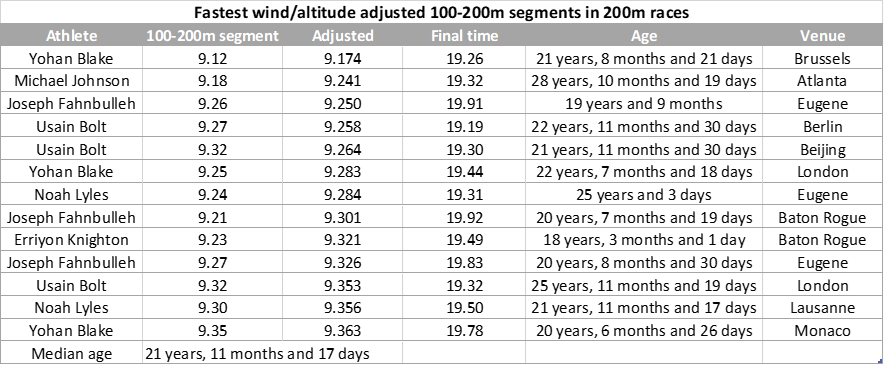
Ten performances were on both the actual list of fastest 100-200m segments and the list of fastest wind and altitude adjusted 100-200m segments. The few changes between the two lists only made the median age increase by a few months.
There have only been seven
wind and altitude adjusted sub-9.3 performances compared to thirteen actual
sub-9.3 performances. The median age in those seven performances is 22 years, 7
months and 18 days. So roughly one year older than the actual sub-9.3 list but
still very young.
That peak speed maintenance
performance among top sprinters in the 200m generally happens at a young age
seems to be pretty clear. The more interesting question is why? I think that
one possible explanation could be that running at a very high speed while being
fatigued puts a lot of strain on the body. So perhaps very young sprinters are
better equipped for dealing with that kind of strain on the body. On this top
wind and altitude adjusted list there are only three performances where the
sprinter was 25 years or older at the time. In those three performances Michael
Johnson got a strain in his right hamstring at the end of his 19.32, Usain Bolt
felt a strain on his back during his 19.32 and Noah Lyles has talked in detail
about how the last part of his 19.31 performance was so tough that he was
grateful that he made it over the line.* With this in mind it is also
interesting to note that all of those three performances from 25+ year old
sprinters happened in global finals where both the stakes and the adrenaline
are at its highest. By comparison only three out of the ten performances from
younger sprinters happened in global finals. So it seems to me like the
relatively speaking older sprinters may have needed that extra rush of
adrenaline in order to push themselves to that level of speed maintenance
performance in the 200m. No matter what your age is the closing part of the
200m is always going to be tough on the body especially when we are talking
about running all-time fast splits after a high effort curve. But perhaps
sprinters can handle that slightly better during their early 20's. That is at
least the best theory that I can come up with at the moment.
It is of course also
possible that it is a coincidence that most of the fastest 200m finishers so
far has peaked at an early age and that this will change in the future. In
order to get a more complete view of this I took a look back in time. These are
the lists of the fastest wind and altitude adjusted 100-200m segments of all
time from 10, 20, 30 and 40 years ago.
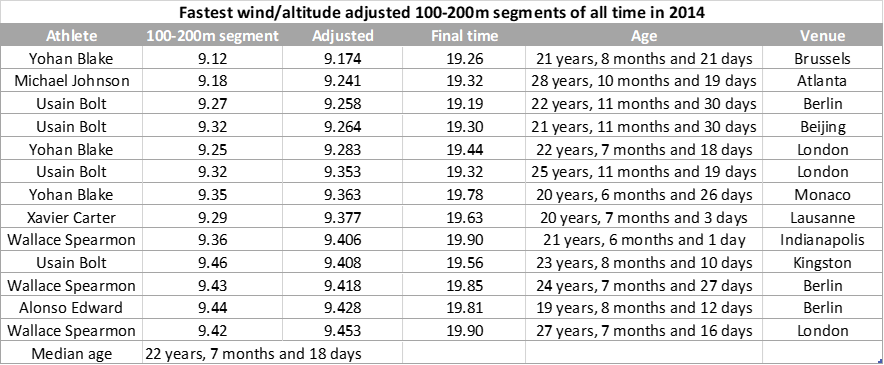
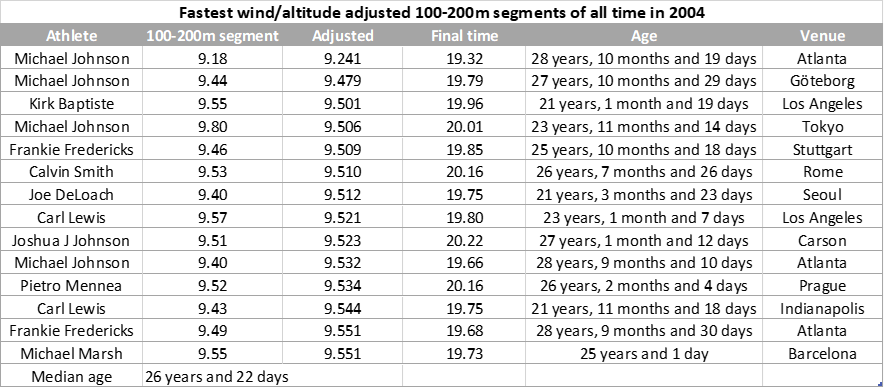
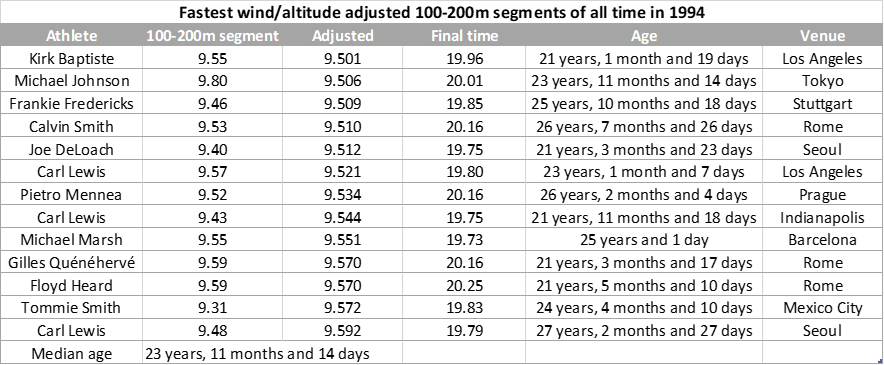
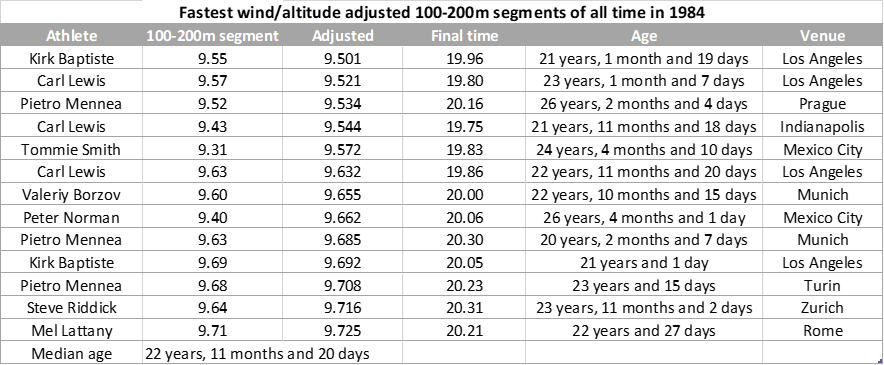
It is interesting to note that while the median age of the top performers generally has been between 21 and 23 years of age, the median age on the list was actually as high as 26 years and 22 days in 2004. At that point some relatively late bloomers had driven the median age up more than two years compared to 10 years earlier. Then the arrival of the Bolt, Blake, Spearmon, Carter, Edward generation pulled the median age all the way back down to 22 years, 7 months and 18 days during the next 10 years. Since then the median age has kept going down all the way to the 21 years, 11 months and 17 days that it is at today. So over the last 20 years the median age has dropped more than four years and while there has been some variation over time most things still seem to point towards that peak speed maintenance performance in the 200m generally happens at a very young age.
* "For a while Johnson
could only sort happily through all the things that were his to savor: the win,
the completion of his double, the dizzying time. He walked a lap of
flag-wrapped joy with an ice pack on the back of his right knee, having felt a
low hamstring twinge in the last five meters. The slight strain, which would
keep him out of the 4x400 relay on Saturday, mattered not at all in the giant
shadow of this towering record." https://vault.si.com/vault/1996/08/12/michael-johnson-1996-olympics-200m-record
"The world record was
possible when I came off the corner but I guess I wasn't fit enough," he said.
"I was fast but not fit enough, I could feel the strain on my back so I tried
to keep my form and keep going. It is hard for me, I really dedicate to my
work, I know what London meant to me, and I gave it my all. I gave it my best
it was hard I really wanted to break the world record and tried but just not
fit enough." https://www.telegraph.co.uk/sport/olympics/9465927/Usain-Bolt-says-injury-prevented-world-record-time-in-200m-final-at-London-2012-Olympic-Games.html
"Because you know the
saying once you reach top end the only place its gonna stay or go down. You
know I hit it, stayed and I was dropping. And I was like oh my gosh what do I
do? I was just alright I am just gonna hold my form and run through the line
and why is my back bending so much? And all of a sudden I feel like this (moves
his arms) the lactic acid was coming and I was like what is this? And I crossed
the line and I was like thank god that we got through that line." https://www.youtube.com/watch?v=N9ZyLGviLAE&t=608s